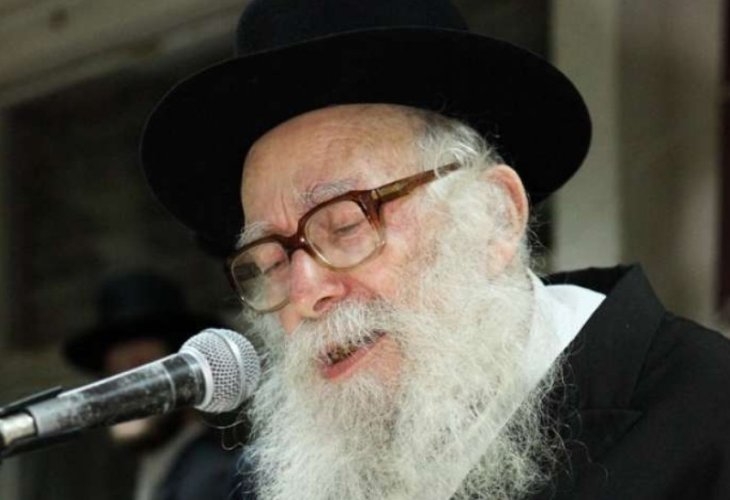Personal Stories
“It Was a Lesson I’ll Never Forget,” Said the Rabbi’s Son
From found money to neighborly kindness, the late Rabbi Nissim Karelitz taught life-changing Torah in simple, everyday moments.
 Rabbi Nissim Karelitz zt"l (Photo: Yaakov Nahumi, Flash 90)
Rabbi Nissim Karelitz zt"l (Photo: Yaakov Nahumi, Flash 90)Rabbi Avraham Yeshayahu Karelitz, rabbi of the Halegman synagogue, once opened up about the life and teachings of his beloved father, Rabbi Nissim Karelitz, one of the great Torah leaders of our time. The following stories, shared in an article by M. Berman in Yated Ne’eman, reveal not only a sage, but a father who guided with warmth, gentleness, and a deep commitment to Torah.
“One moment from my childhood will stay with me forever,” Rabbi Karelitz began. “It was a Friday afternoon, and I had found a large bill on the street. As a child, I was thrilled and ran to show it to my father. He opened a big Gemara (Talmud) and taught me the Mishnah in Bava Metzia, which says that anything a child finds actually belongs to his father. After explaining the halacha (Jewish law), he gently asked, ‘So, who does the money belong to, according to the Torah?’
“‘To you, Abba,’ I said, a little embarrassed. But then he smiled and said, ‘Take the money, and when you go out to shop for Shabbat, buy groceries—and something special for yourself too, in honor of Shabbat.’
“That day, he taught me two things I never forgot: First, how important it is to live according to halacha. Second, how precious and joyful Shabbat is.”
He recalled another time, standing near the family’s bookshelf, when his father passed by and asked him kindly, “Well, Yeshayahu, which tractate of Shas (Talmud) do you know?” That simple question, asked with a smile, left a deep impression: Torah learning isn’t a burden—it’s something to grow in, one page at a time.
Rabbi Nissim zt"l was especially careful about emet—truth. “He couldn’t tolerate falsehood,” his son remembered. “He taught us that lying isn’t just a bad act—it becomes a habit. So instead of catching a child in a lie and shaming them, he would tell stories about the greatness of truth and the damage of dishonesty. Slowly, the lesson would take root in our hearts.”
But when it came to lying, Rabbi Nissim would go beyond his usual gentle approach. “That was one area where he believed even a punishment could be necessary—just to show how serious it is. But even then, he never wanted to break a child’s spirit.”
Another memory speaks to his father’s deep respect for teachers. “A melamed (Torah teacher) once came to our house, discouraged. He felt he wasn’t learning enough himself and thought maybe he should stop teaching. My father was clear: ‘What do you expect—that the ones who teach children should be people who don’t know how to learn? You never lose by teaching Torah to children!’”
When people asked Rabbi Nissim how to inspire the next generation, he would say: “In the past, people knew how to value deeper things. Today too, if you tell children stories and show them how special Torah and mitzvot (commandments) are, their hearts will follow.”
Despite being one of the leading Torah authorities, Rabbi Nissim led his home with quiet strength and serenity. “He never barked orders,” said his son. “Instead, he showed us the beauty and clarity of halacha—how natural and true it is to live by it.”
One time, a bar mitzvah boy came asking for a blessing to become a great Torah scholar. Rabbi Nissim smiled and said, “None of the great Torah sages studied in order to become famous. They studied because they wanted to understand the daf (page) of Gemara in front of them. That’s what makes someone great.”
Even in small details, Rabbi Nissim lived halacha with thoughtfulness. On Sukkot, there was a family brit milah (circumcision) in the sukkah on the roof. He was known to wash hands very generously, using lots of water. But that day, when water had to be hauled up in buckets, he used just the required amount. “To one grandchild’s surprise, he gently explained that it’s more important not to burden others, and that halacha tells us the minimum is enough.”
And then there’s the story Rabbi Avraham Yeshayahu said he’d never forget: “One time, there was a sewage blockage in our building. It wasn’t even connected to our apartment, but the neighbors came to us, asking for help. My father immediately told my mother to call a plumber—at our expense. I was shocked. We were poor, and this wasn’t fair! I felt upset at the injustice of it.
“But my father took me aside and said, ‘Shayaleh, remember this: living peacefully with your neighbors is sometimes worth spending a little money. It’s a price worth paying for peace.’”
That, said Rabbi Karelitz, was a lesson for life.

